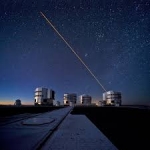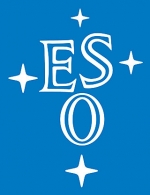Displaying items by tag: ESO
VLT (Very Large Telescope)
The Very Large Telescope (VLT) is a telescope operated by the European Southern Observatory on Cerro Paranal in the Atacama Desert of northern Chile.
The VLT consists of four individual telescopes, each with a primary mirror 8.2 m across, which are generally used separately but can be used together to achieve very high angular resolution. The four separate optical telescopes are known as Antu, Kueyen, Melipal and Yepun, which are all words for astronomical objects in the Mapuche language. The telescopes form an array which is complemented by four movable Auxiliary Telescopes (ATs) of 1.8 m aperture.
The VLT operates at visible and infrared wavelengths. Each individual telescope can detect objects roughly four billion times fainter than can be detected with the naked eye, and when all the telescopes are combined, the facility can achieve an angular resolution of about 0.001 arc-second. This is equivalent to roughly 100 metres (330 feet) resolution at the distance of the Moon. Unfortunately this means the VLT cannot be used to directly image the Apollo Moon landing sites as the largest objects left behind during each mission would only have been abou
MUSE (Multi Unit Spectroscopic Explorer)
The Multi Unit Spectroscopic Explorer (MUSE) is a second generation instrument installed at the Very Large Telescope (VLT) of the European Southern Observatory (ESO).
It is an integral-field spectrograph operating in the visible wavelength range. It combines a wide field of view with a fine spatial sampling and a large simultaneous spectral range. It is designed to take advantage of the improved spatial resolution provided by adaptive optics. MUSE had first light on the VLT on 31/01/2014.
Terma GmbH
Terma GmbH is the German software and services company of Terma A/S www.terma.com that specialises in mission-critical products, software, and services for space missions.
It has more than 70 staff around Germany, experts in a wide range of systems and operations engineering for the support of space programmes and missions. It specialises in the development of customised ground/space segment applications such as Mission Control Systems, Operational Simulators, Automation, and Software Validation Systems. It provides professional engineering supports and training at the customer sites. Terma GmbH offers products and services in the emulation of the LEON family processors as well as in the Integration & System Testing of complex systems interacting at different geographical locations.
Please also find us on:
LinkedIn: http://www.linkedin.com/company/166334?trk=tyah
Twitter: https://twitter.com/Terma_Global
YouTube: http://www.youtube.com/user/TermaTV
ESO, European Southern Observatory
European Southern Observatory, is the foremost intergovernmental astronomy organisation in Europe and the world's most productive astronomical observatory. ESO provides state-of-the-art research facilities to astronomers and is supported by Austria, Belgium, the Czech Republic, Denmark, Finland, France, Germany, Ireland, Italy, the Netherlands, Poland, Portugal, Spain, Sweden, Switzerland and the United Kingdom, along with the host state of Chile. Several other countries have expressed an interest in membership.
ESO, formally the European Organisation for Astronomical Research in the Southern Hemisphere, is usually known as The European Southern Observatory.
ESO's main mission, laid down in the 1962 Convention, is to provide state-of-the-art research facilities to astronomers and astrophysicists, allowing them to conduct front-line science in the best conditions. The annual Member State contributions to ESO are approximately 198 million euros and ESO employs around 700 staff members. By building and operating a suite of the world's most powerful ground-based astronomical telescopes enabling important scientific discoveries, ESO offers numerous possibilities for technology spin-off and transfer, together with high technology contract opportunities and is a dramatic showcase for European industry.
The ESO Headquarters (comprising the scientific, technical and administrative centre of the organisation) are located in Garching near Munich, Germany. In Chile, ESO operates the Vitacura centre as well as three unique observing sites: La Silla, Paranal and Chajnantor.
ESO is building the 39-metre Extremely Large Telescope, the ELT, which will become “the world’s biggest eye on the sky”.



